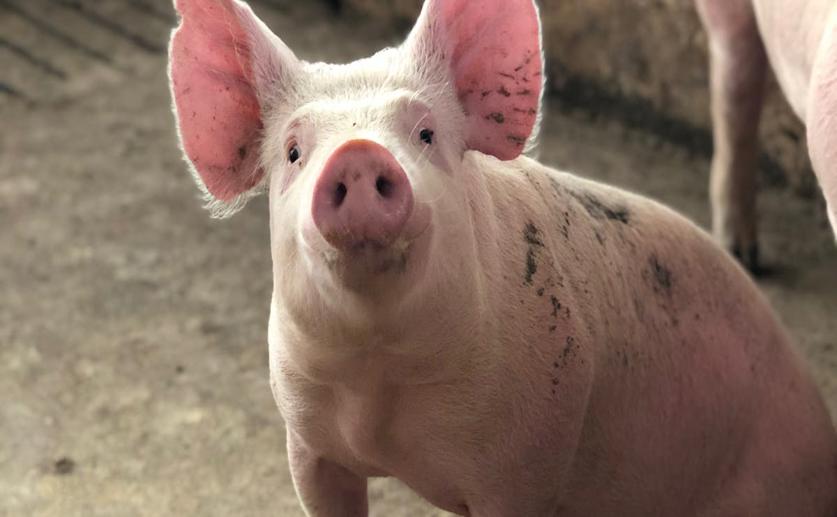
Agriculture News

 26th July, 2024
| Jenn Hoskins
26th July, 2024
| Jenn Hoskins
Boosting Garden Cress Growth with Humic Acids Controlled by Phenolic Radicals
A study by the University of Basilicata reveals that both natural and synthetic humic acids boost garden cress growth, with natural sources offering diverse benefits like enhanced root development and stress resilience, while synthetic types allow for targeted applications.

 26th July, 2024
| Jenn Hoskins
26th July, 2024
| Jenn Hoskins
How Seed Treatment with Plant Hormones Helps Corn Grow in Salty Soil
Seed priming with indole-3-acetic acid (IAA) enhances maize seedling resilience under salt stress by boosting germination, sugar content, and antioxidant activity. This technique offers a promising solution to improve crop yields in challenging conditions.

 26th July, 2024
| Jenn Hoskins
26th July, 2024
| Jenn Hoskins
Understanding Flowering Time in Chickpeas Through Genetic and Trait Analysis
Researchers at the University of Córdoba have identified key gene variants controlling flowering time in chickpeas, a crucial step towards breeding drought and heat-resistant varieties. This advancement promises higher yields and improved food security in challenging climates.

 25th July, 2024
| Jenn Hoskins
25th July, 2024
| Jenn Hoskins
Dataset for Detecting Small Onions and Flowering Plants
A new dataset from Universidad EAFIT offers high-res aerial images to detect green onion and foliage flower crops, enhancing precision agriculture. This tech-driven approach aims to support small farmers, improve crop monitoring, and boost food security.

 25th July, 2024
| Jenn Hoskins
25th July, 2024
| Jenn Hoskins
Shallow Water Planting Boosts Cold Resistance in Young Tobacco Plants
Hunan Agricultural University's study reveals that shallow water seeding enhances cold tolerance in tobacco seedlings by promoting root development and boosting antioxidant enzyme activity, offering valuable insights for improving crop resilience in cold-prone regions.

 25th July, 2024
| Jim Crocker
25th July, 2024
| Jim Crocker
Turning Potato Waste into Blue Pigments Using Beneficial Bacteria
Researchers at the University of La Frontera have found a sustainable way to turn discarded potato waste into valuable blue pigments using Streptomyces lydicus PM7. This method not only tackles potato waste disposal but also offers a cost-effective alternative to synthetic dyes.

 24th July, 2024
| Greg Howard
24th July, 2024
| Greg Howard
Growing Beautiful Orchids: Best Practices for Soil, Light, and Sealing Methods
Orchids face a decline due to over-collection and habitat loss. A study on Cattleya walkeriana shows that using banana pulp in culture mediums, higher light levels, and specific sealing systems can boost growth and survival, offering a practical solution for orchid conservation.

 24th July, 2024
| Jim Crocker
24th July, 2024
| Jim Crocker
Seasonal Vegetables Image Dataset
Researchers from Uttara University have introduced the 'SeasVeg' dataset, featuring 4500 images of ten seasonal vegetables from Bangladesh. Using machine learning models like ResNet50, they achieved up to 99% accuracy in classification, aiding both healthcare and education.

 24th July, 2024
| Jim Crocker
24th July, 2024
| Jim Crocker
Smart Food Packaging Using Gelatin and Beetroot Extract Films
Researchers at Kermanshah University have developed edible films using gelatin, HPMC, and red beet betalain to monitor food freshness. These smart films change color to indicate spoilage, offering consumers an easy visual cue for food quality, enhancing safety and storage.

 24th July, 2024
| Jenn Hoskins
24th July, 2024
| Jenn Hoskins
Pollination Services for Watermelon and Green Tomato Crops in Coastal Regions
Bees are vital for pollinating crops like watermelon and green tomato. A study in Jalisco, Mexico, found that honeybees are crucial for fruit production, highlighting the need to conserve habitats to support pollinator populations and ensure food security.

 24th July, 2024
| Jim Crocker
24th July, 2024
| Jim Crocker
Melatonin Extends Okra Freshness by Slowing Softening and Reducing Weight Loss
Researchers found that melatonin can extend the shelf life of okra by maintaining firmness and reducing weight loss. It works by modulating genes related to cell wall integrity and promoting stomatal closure, offering a novel solution to postharvest spoilage.
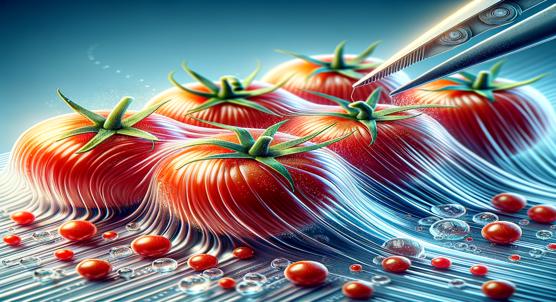
 24th July, 2024
| Jim Crocker
24th July, 2024
| Jim Crocker
New Chitosan-Onion Films Help Keep Cherry Tomatoes Fresh Longer
Researchers at Shenyang Medical College developed chitosan-onion polysaccharide films to preserve fruits and vegetables. These films enhance antimicrobial and antioxidant properties, effectively delaying spoilage in cherry tomatoes, though mechanical issues remain.
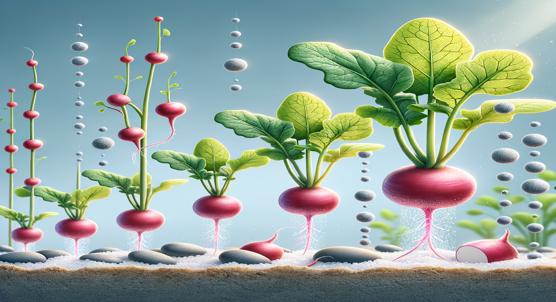
 24th July, 2024
| Greg Howard
24th July, 2024
| Greg Howard
How Zinc Oxide Nanoparticles Help Radish Seeds Grow in Salty Conditions
A new study from Nanjing Agricultural University uses near-infrared hyperspectral imaging (NIR-HSI) to non-destructively monitor radish seed germination. This method enhances seed quality assessment, offering faster, more accurate results compared to traditional techniques.

 24th July, 2024
| Greg Howard
24th July, 2024
| Greg Howard
Boosting Apple Water Efficiency and Strength by Regulating Key Plant Enzyme
Researchers at Northwest A&F University found that overexpressing the FERONIA receptor kinase gene in apple trees enhances water use efficiency and drought resilience. This discovery could lead to more robust apple crops under climate stress.
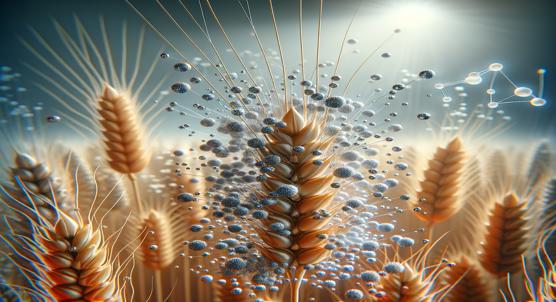
 24th July, 2024
| Jenn Hoskins
24th July, 2024
| Jenn Hoskins
Silver Nanoparticles Impact Disease Control in Various Wheat Types
A study by Yasouj University shows that silver nanoparticles can boost antioxidant properties in wheat, potentially controlling bacterial blight and improving crop resilience. This method could stabilize yields and reduce the ecological impact of wheat farming.
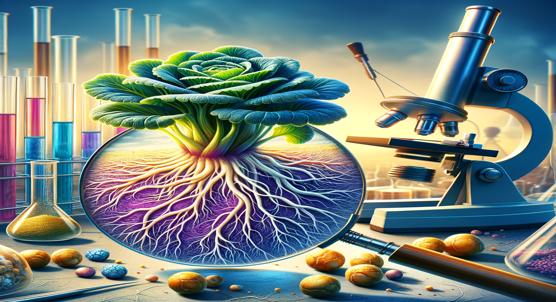
 23rd July, 2024
| Jenn Hoskins
23rd July, 2024
| Jenn Hoskins
Nano-silicon and Sodium Reduce Damage from Low Potassium in Chicory
Researchers found that adding nano-silicon and sodium to potassium-deficient chicory boosts potassium accumulation and use efficiency, improving plant health. However, sodium in potassium-sufficient conditions can harm chicory's physiological aspects.
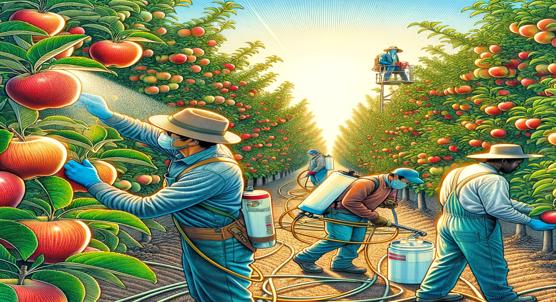
 23rd July, 2024
| Greg Howard
23rd July, 2024
| Greg Howard
Measuring Skin Exposure to Pesticides for Workers in Apple Orchards
A University of Bordeaux study reveals significant variability in captan residues on apple orchards, emphasizing the need for better safety protocols to protect agricultural workers from potential health risks, including cancer, due to pesticide exposure.

 23rd July, 2024
| Jenn Hoskins
23rd July, 2024
| Jenn Hoskins
Smart Detection System for Pomegranates Using Lightweight Technology
Researchers at Henan Institute developed YOLO-Granada, an advanced algorithm for pomegranate detection, improving speed and efficiency. It reduces computational load and enhances accuracy, making real-time orchard management feasible and addressing labor shortages.

 23rd July, 2024
| Jenn Hoskins
23rd July, 2024
| Jenn Hoskins
Finding the Best Places for Wild Tomatoes to Improve Cultivated Tomato Farming
Climate change threatens global agriculture, including tomatoes. Sun Yat-sen University's research shows wild tomatoes' habitat data can help improve domesticated varieties' resilience, especially against drought. Conserving wild relatives is key for sustainable crop development.
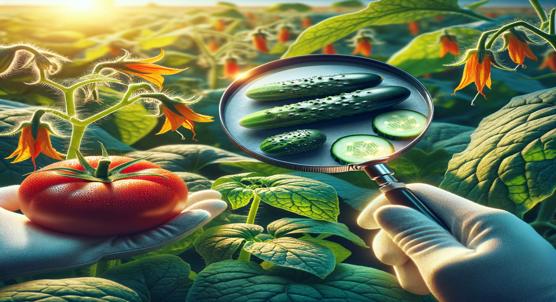
 23rd July, 2024
| Greg Howard
23rd July, 2024
| Greg Howard
Assessing Fluoxapiprolin Residues and Risks in Cucumber and Tomato Crops
Anand Agricultural University's study on fluoxapiprolin in cucumber and tomato shows rapid dissipation of residues, posing minimal consumer risk when good practices are followed. Proposed pre-harvest intervals ensure food safety and environmental protection.

 23rd July, 2024
| Greg Howard
23rd July, 2024
| Greg Howard
Boosting Mushroom Growth and Nutrition Using Local Agricultural By-Products
Addis Ababa University’s study shows that cultivating Pleurotus ostreatus mushrooms on locally available agro-industrial byproducts can boost yields, enhance nutritional content, and tackle food insecurity in Ethiopia, while also promoting sustainability and reducing pollution.
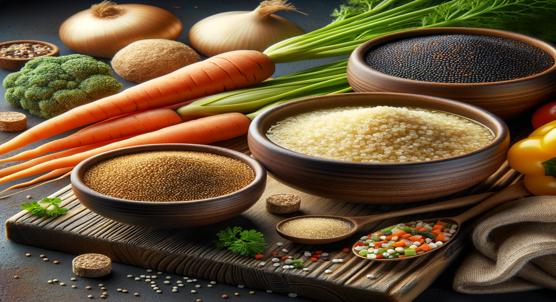
 23rd July, 2024
| Jenn Hoskins
23rd July, 2024
| Jenn Hoskins
Creating Healthy, Low-Sugar Soups Using Foxtail, Barnyard, and Kodo Millets
Periyar University optimized a millet soup mix using foxtail, barnyard, and kodo millets, enhancing its health benefits. The mix boasts high fiber, strong antioxidants, and low glycemic index, making it ideal for gut health and diabetes management.

 22nd July, 2024
| Jenn Hoskins
22nd July, 2024
| Jenn Hoskins
Boosting Mushroom Growth and Nutrition Using Local Agricultural By-Products
Addis Ababa University's study shows that using local agro-industrial byproducts like sugarcane bagasse and cow dung for mushroom cultivation can boost yields and nutritional value, offering a sustainable solution to food insecurity and pollution in Ethiopia.

 22nd July, 2024
| Greg Howard
22nd July, 2024
| Greg Howard
How Fiber and Probiotics Affect Milk Production and Eating Habits in Dairy Cows
The University of Wisconsin, Madison study reveals that low-forage diets with microbial supplements boost dry matter intake and milk production in high-producing dairy cows, offering insights for optimizing diets to improve cow health and farm economics.

 21st July, 2024
| Jenn Hoskins
21st July, 2024
| Jenn Hoskins
Nutrient Competition in Apple Blossoms Prevents Fire Blight Infection
A study reveals how Pantoea agglomerans outcompetes the fire blight pathogen Erwinia amylovora for arabinogalactan in apple flowers, suppressing its virulence. This microbial competition offers new strategies for disease control, reducing reliance on chemical treatments.
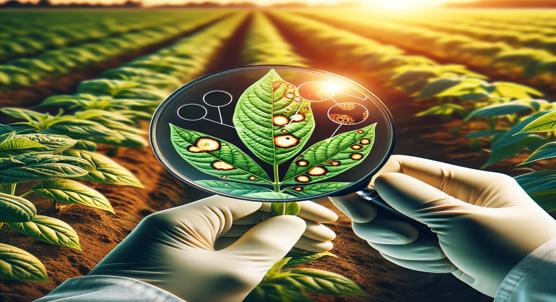
 21st July, 2024
| Jenn Hoskins
21st July, 2024
| Jenn Hoskins
Improving Deep Learning for Identifying Crop Diseases in Real-World Conditions
Automated crop disease identification via CNNs shows high accuracy in labs but drops significantly in real-world fields. The study suggests improving data quality and diversity over new model designs for better practical use, aiding farmers and boosting agricultural productivity.

 21st July, 2024
| Jim Crocker
21st July, 2024
| Jim Crocker
Creating Eco-Friendly Fungicides from Rosin for Sustainable Crop Protection
Researchers at Northwest A&F University have developed eco-friendly rosin-based fungicides, with Co. 6a showing high efficacy against apple canker. It damages fungal cell membranes and disrupts energy production, offering a novel, sustainable crop protection solution.
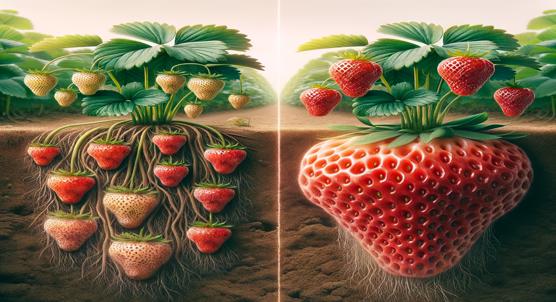
 21st July, 2024
| Greg Howard
21st July, 2024
| Greg Howard
How Calcium and Nitrogen Affect Strawberry Size and Firmness
Researchers at the Leibniz Institute found that strawberry bruising and decay can be reduced by analyzing cell size distribution and nutrient treatments. This study enhances fruit tissue compression models, aiding in better agricultural practices and reducing food waste.
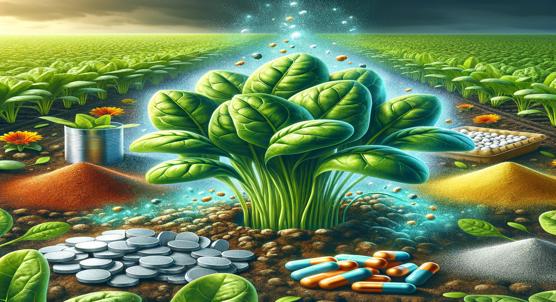
 20th July, 2024
| Jim Crocker
20th July, 2024
| Jim Crocker
Boosting Spinach Nutrition and Reducing Soil Toxins with Various Zinc Sources
Recent research from Northwest A&F University shows that zinc oxide nanoparticles can significantly reduce cadmium contamination in soil and plants, promoting healthier spinach growth and offering a promising solution for mitigating heavy metal pollution in agriculture.
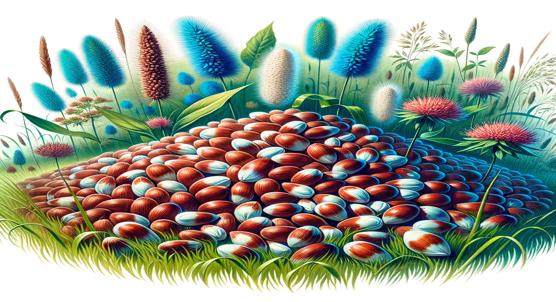
 20th July, 2024
| Greg Howard
20th July, 2024
| Greg Howard
Seed Yield Linked to Growth Hormone Genes in Wild Kentucky Bluegrass
Researchers at Ningxia University reveal that cytokinins, plant hormones crucial for cell division, significantly influence seed yield in Kentucky bluegrass by regulating gene expression during panicle development. This insight could enhance agricultural productivity.
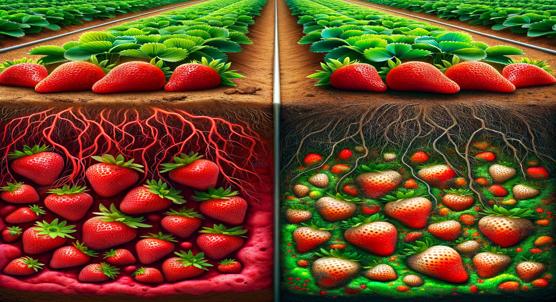
 20th July, 2024
| Jim Crocker
20th July, 2024
| Jim Crocker
How Bacteria Communities Form in Healthy and Unhealthy Strawberry Farms
A study by the Polish Academy of Sciences reveals key bacterial differences in healthy vs. unhealthy strawberry farms. Identifying beneficial microbes could enhance plant health and productivity, promoting sustainable agriculture and food security.
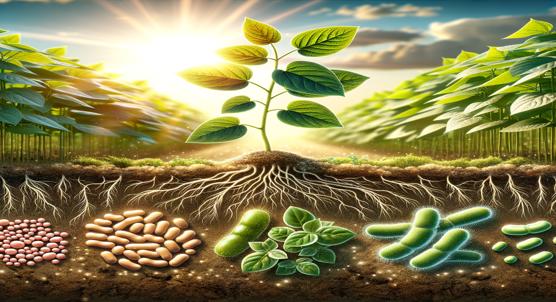
 20th July, 2024
| Greg Howard
20th July, 2024
| Greg Howard
Bacterial Communities Drive Soil Health, Plant Growth, and Soybean Yield
São Paulo State University’s study reveals that using specific bacterial consortia in soybean cultivation can boost soil fertility, plant health, and crop productivity. This microbial approach reduces the need for fertilizers and pesticides, promoting sustainable agriculture.

 20th July, 2024
| Jenn Hoskins
20th July, 2024
| Jenn Hoskins
Cassava Yield Stability and Genetic Traits in Tropical Humid Regions
Cassava, vital for millions, faces challenges from environment interactions affecting yield. A study identified stable, high-performing genotypes using advanced methods, aiding in the development of robust cultivars for better food security and nutrition.
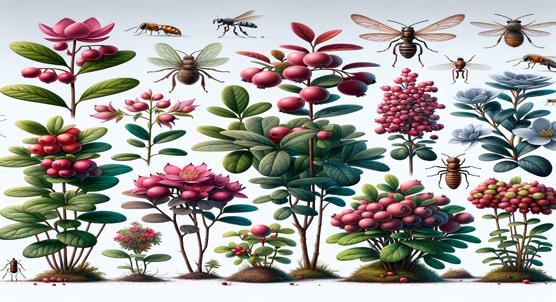
 20th July, 2024
| Greg Howard
20th July, 2024
| Greg Howard
Cranberry Plant Variations and Their Resistance to Multiple Insect Pests
The University of São Paulo's study reveals that cranberry genotypes with higher total phenolics offer better resistance to herbivores. This insight is crucial for breeding programs, suggesting that modern hybrids, focused on yield, may be more susceptible to pests.
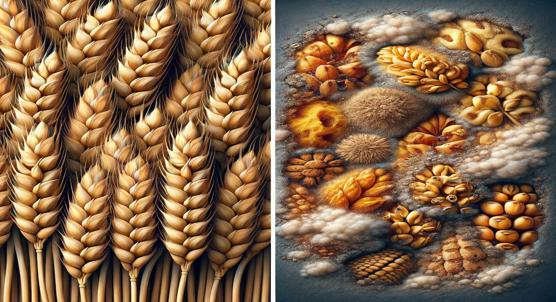
 20th July, 2024
| Jenn Hoskins
20th July, 2024
| Jenn Hoskins
How Storage Conditions Affect Toxin Levels in Wheat
A study by Cranfield University reveals how storage conditions like moisture and temperature affect mycotoxin levels in wheat. Findings show significant variations in toxin concentrations, emphasizing the need for rigorous monitoring to ensure food safety.
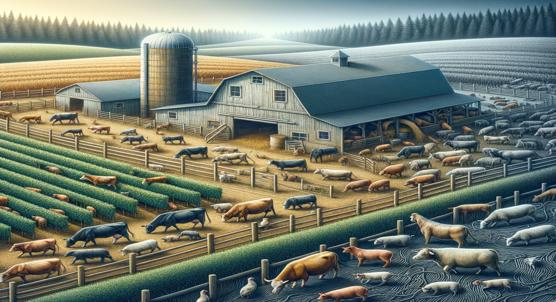
 20th July, 2024
| Jenn Hoskins
20th July, 2024
| Jenn Hoskins
Farm Practices and Species Variety Linked to Higher Tuberculosis Risk on Farms
A study by Universidad de León reveals that older cattle, larger herds, fragmented farms, and wildlife presence increase TB risk in Western Spain's cattle farms. Targeted biosecurity measures can help manage and reduce this risk, aiding in TB eradication efforts.
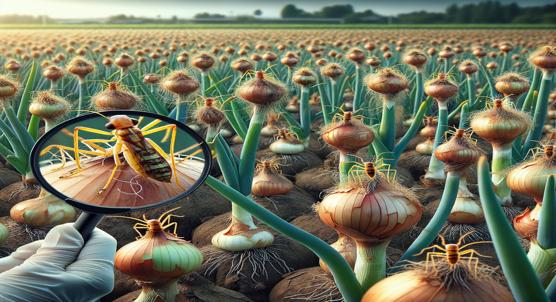
 20th July, 2024
| Jim Crocker
20th July, 2024
| Jim Crocker
New Sampling Plan to Classify Thrips Populations in Onion Fields
Cornell researchers developed a sequential sampling plan for onion thrips, cutting sample size by 78% and maintaining 96% decision accuracy. This method saves time and labor while effectively managing thrips populations in onion fields.

 19th July, 2024
| Jenn Hoskins
19th July, 2024
| Jenn Hoskins
Using CO2 Lasers to Label Fresh Produce: Impact on Quality, Safety, and Cost
Kansas State University found CO2 laser-labeling for produce reduces environmental impact and maintains visual quality but increases microbial risk on text-labeled items. Addressing this is key for safer, sustainable labeling.

 19th July, 2024
| Jenn Hoskins
19th July, 2024
| Jenn Hoskins
How Chicken Manure and Biochar Affect Nutrients in Sweet Potato Leaves and Roots
Combining poultry manure and wood biochar significantly boosts sweet potato nutrient content, enhancing both leaf and root minerals. This sustainable approach also proves economically viable, offering higher crop yields and returns for farmers.
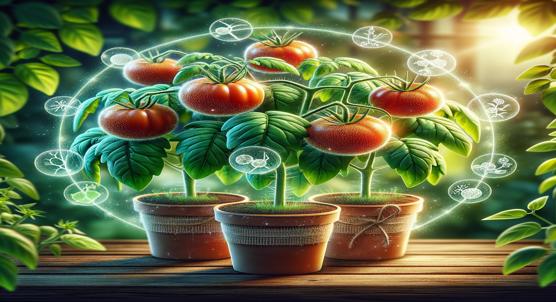
 19th July, 2024
| Greg Howard
19th July, 2024
| Greg Howard
How Azelaic Acid Helps Tomatoes Resist Fungal Infections
Researchers in Iran found that treating tomato plants with azelaic acid boosts their defense against early blight. The treatment enhances key enzymes and modulates defense pathways, reducing oxidative stress and improving resistance, potentially leading to more resilient crops.
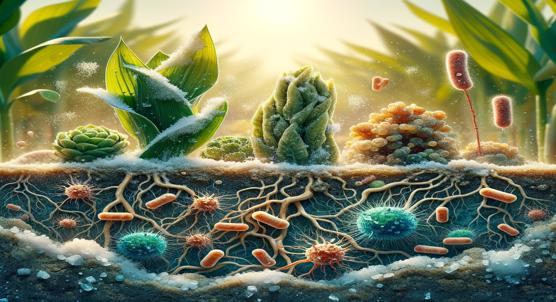
 19th July, 2024
| Jim Crocker
19th July, 2024
| Jim Crocker
How Salty Soil Affects Bacteria in Plants and Crops
A study from Humboldt University reveals specific bacteria help salt-tolerant plants, or halophytes, survive in high-salinity soils. Identifying these bacterial markers could enhance crop resilience amidst rising soil salinity due to climate change and human activities.

 19th July, 2024
| Jenn Hoskins
19th July, 2024
| Jenn Hoskins
Biopesticide Impact on Crops Using Extracts from Marigold Plants
Marigold extracts show promise as eco-friendly pesticides, effectively killing major crop pests in a study by PES University. These plant-based solutions could reduce reliance on harmful chemicals, supporting sustainable agriculture.

 19th July, 2024
| Jenn Hoskins
19th July, 2024
| Jenn Hoskins
Genes Influencing Flowering in Bambara Groundnut
Researchers at the Federal University Oye-Ekiti have identified genetic markers controlling flowering in Bambara groundnut. These findings could help improve crop yields and resilience by targeting genes involved in stress responses and developmental processes.

 18th July, 2024
| Greg Howard
18th July, 2024
| Greg Howard
Creating Natural Color-Based Gels to Keep Meat Fresh Longer
Researchers at Hebei Normal University developed a black wolfberry anthocyanin-based label that changes color to monitor Dorang lamb freshness. This innovative label extends shelf-life from 6 to 16 days, offering a reliable, visual freshness indicator and reducing food waste.

 18th July, 2024
| Greg Howard
18th July, 2024
| Greg Howard
Ensuring Safe Insecticide Levels in Broccoli Using Advanced Testing Methods
Dr. YS Parmar University's study on broccoli shows that using the QuEChERS method and LC-MS/MS, residues of three insecticides diminish quickly and pose no dietary risk. This research supports safe pesticide use and offers guidelines for regulatory authorities.

 18th July, 2024
| Jenn Hoskins
18th July, 2024
| Jenn Hoskins
Understanding How Wheat Copes with Drought and Salt Stress
A study from Ludong University reveals the vital role of Alfin-like proteins in plant stress responses. These proteins regulate genes crucial for coping with drought and salinity, offering potential for developing more resilient crops and ensuring food security.

 18th July, 2024
| Jim Crocker
18th July, 2024
| Jim Crocker
Spider Mite and Bacteria Presence in Cotton Fields
Spider mites threaten cotton crops in Türkiye, with Tetranychus urticae and Tetranychus turkestani being the most common. The study links their pesticide resistance to endosymbionts like Wolbachia and Rickettsia, suggesting new pest management strategies are needed.
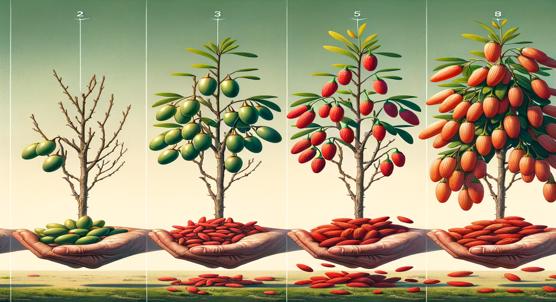
 17th July, 2024
| Greg Howard
17th July, 2024
| Greg Howard
Changes in Goji Berry Toughness and Ease of Picking Over Time
Beijing Forestry University’s study on goji berries reveals the best harvesting times for top cultivars Ningqi No. 1 and Ningqi No. 7, optimizing quality and reducing damage. Key findings suggest late afternoon for Ningqi No. 1 and morning for Ningqi No. 7.
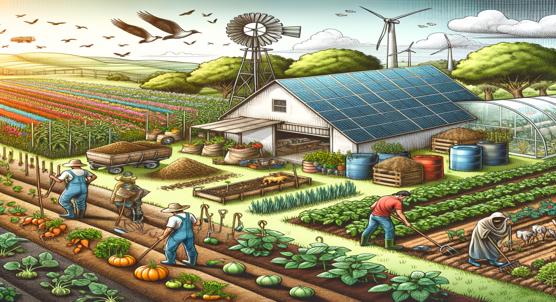
 17th July, 2024
| Jenn Hoskins
17th July, 2024
| Jenn Hoskins
Challenges Faced by Organic Farmers in Transition to Eco-Friendly Farming
Organic farming in Central Uganda shows promise with diverse crop adaptation and integrated animal farming. However, challenges like limited waste recycling and water harvesting equipment remain. Investing in these areas could enhance sustainability and resilience.
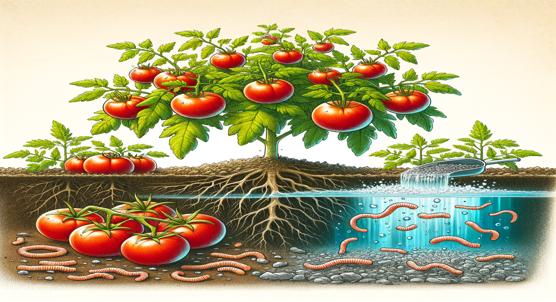
 16th July, 2024
| Jim Crocker
16th July, 2024
| Jim Crocker
Using Worms to Clean Wastewater Helps Tomato Growth and Reduces Metal Absorption
Vermicompost significantly reduces heavy metal accumulation in tomatoes irrigated with wastewater, enhancing plant growth and yield. This study by the University of Agriculture Peshawar suggests vermicompost as a sustainable solution for safer food production in polluted areas.
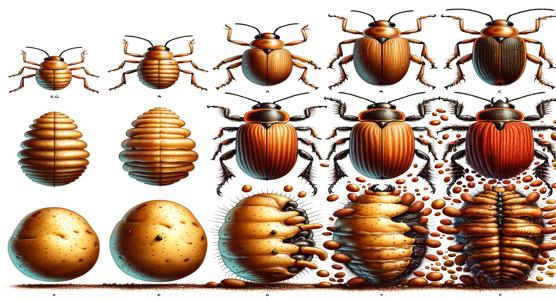
 16th July, 2024
| Greg Howard
16th July, 2024
| Greg Howard
Gene Activity Changes in Different Life Stages of Potato Pest
Researchers at The University of Arizona uncovered how the bacteria "Ca. Liberibacter solanacearum" infects potato psyllids and tomato plants. They found that gene expression varies by host and psyllid developmental stage, offering insights for new disease management strategies.

 16th July, 2024
| Jenn Hoskins
16th July, 2024
| Jenn Hoskins
Carbon Footprint of Mixed Farming and Grazing Beef Systems Using Long-Term Data
A study by the Instituto Nacional de Investigación Agropecuaria reveals that mixed crop-livestock systems can significantly reduce greenhouse gas emissions through better soil carbon management, offering a sustainable alternative to high-input farming in South America.

 16th July, 2024
| Jenn Hoskins
16th July, 2024
| Jenn Hoskins
A New Way to Grow Sugar Beets Without Extra Water by Planting in Autumn
Researchers in Türkiye found that autumn-sown sugar beets can thrive in the Aegean Coastal Zone without irrigation using ridge sowing. This method conserves water and ensures high yields and sugar content, offering a sustainable alternative for water-scarce regions.

 16th July, 2024
| Jenn Hoskins
16th July, 2024
| Jenn Hoskins
Drought Tolerance in Pure Lines from Crossbreeding Upland Cotton
A study by Aydin Adnan Menderes University identifies key cotton traits like fiber length and boll weight that enhance drought tolerance. Using advanced analyses, researchers pinpoint promising genotypes for breeding, crucial for stable yields amid climate change.
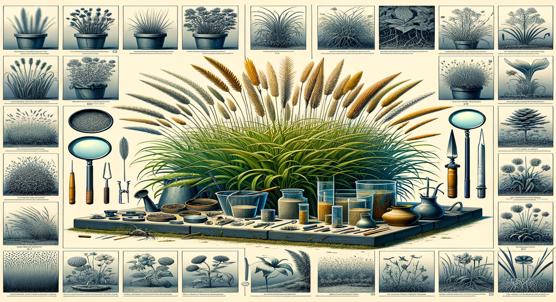
 16th July, 2024
| Jenn Hoskins
16th July, 2024
| Jenn Hoskins
Studying Different Types of Bermuda Grass in Shaded Areas Across Various Regions
A study by Yangzhou University identified shade-tolerant bermudagrass genotypes, revealing L01 and L06 as highly resilient. This research aids turf management and breeding, linking genetic, biochemical, and environmental factors to enhance stress tolerance and adaptability.
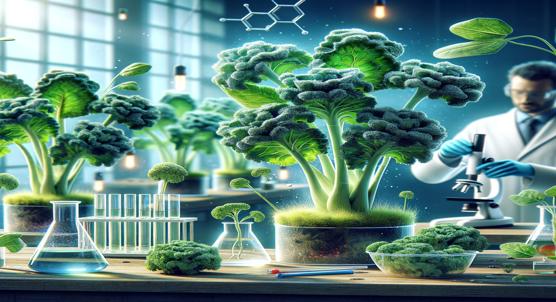
 16th July, 2024
| Jim Crocker
16th July, 2024
| Jim Crocker
How Kale Plants React Differently to Growth Hormones in Lab Conditions
A University of Warsaw study reveals how plant hormones called cytokinins enhance kale's antioxidant properties, steroidal metabolism, and cell integrity. This research could optimize kale cultivation, boosting its nutritional value and health benefits.
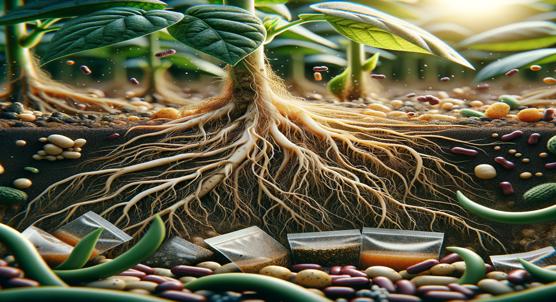
 16th July, 2024
| Jim Crocker
16th July, 2024
| Jim Crocker
Managing Root Rot in Beans with Natural Biocontrol Methods and Compost Tea
An integrated approach using vermicompost tea and beneficial microbes significantly reduces root rot in common beans, boosting growth and yield. This sustainable method offers hope for smallholder farmers in Africa, enhancing productivity and income while promoting soil health.

 14th July, 2024
| Jenn Hoskins
14th July, 2024
| Jenn Hoskins
Tomato Variety Effects on Quality and Soil Cleanup in Mixed Planting Systems
Intercropping hyperaccumulator Sedum alfredii with tomato varieties, especially cherry tomato Hangza 503, can reduce soil cadmium levels and produce safer vegetables, offering a sustainable solution for contaminated soils.
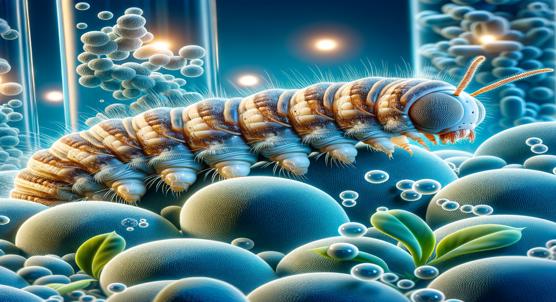
 14th July, 2024
| Jenn Hoskins
14th July, 2024
| Jenn Hoskins
Study on New Biological Controls Against Armyworm
A recent study shows that combining two biological agents, Beauveria bassiana and Heterorhabditis taysearae, is highly effective in controlling the destructive fall armyworm. This eco-friendly approach could offer a robust alternative to chemical pesticides in agriculture.

 14th July, 2024
| Jenn Hoskins
14th July, 2024
| Jenn Hoskins
Understanding How Traits Are Inherited in Farm Animals
The University of Liège study advances our understanding of livestock genetics by using heritability partitioning to estimate the impact of different genetic variants on traits like milk production and fertility, promising more efficient breeding programs.

 13th July, 2024
| Jim Crocker
13th July, 2024
| Jim Crocker
Uncovering Key Rice Genes for Strong Stems and Precision Breeding Applications
Researchers at Yangzhou University have identified a key genetic locus for stem diameter in rice, crucial for lodging resistance. This discovery could lead to the development of high-yield, lodging-resistant rice varieties, securing future food supplies for billions.

 13th July, 2024
| Jenn Hoskins
13th July, 2024
| Jenn Hoskins
How Environment and Genetics Affect Harvest Dates in Sugar Beet Varieties
Research by AREEO highlights optimal harvest times (HD3 and HD4) and stable sugar beet cultivars (Shokoufa and Arya) to boost yield stability. Integrating wild beet genetics and enhancing by-product use can further improve sugar beet's resilience and economic value.
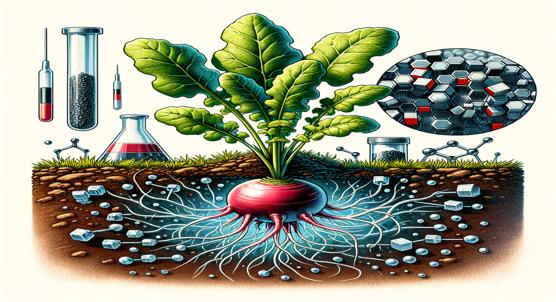
 13th July, 2024
| Jenn Hoskins
13th July, 2024
| Jenn Hoskins
Using Magnetic Nanoparticles to Help Radishes Grow Better in Polluted Soil
Iron oxide nanoparticles can help radish plants overcome cadmium pollution, boosting growth and antioxidant defenses. This innovative approach offers a promising solution for safer crops and sustainable agriculture.
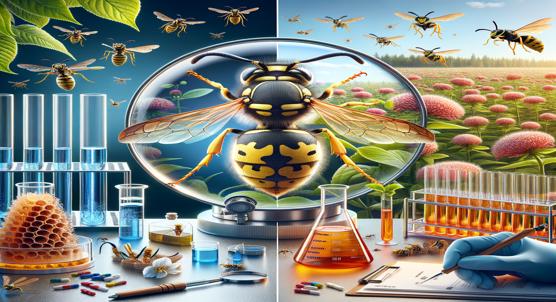
 13th July, 2024
| Greg Howard
13th July, 2024
| Greg Howard
Evaluating the Safety of Insecticides on Beneficial Wasps in Labs and Fields
Research from the University of Trento reveals that while spinosad and λ-cyhalothrin are highly toxic to the parasitoid Ganaspis brasiliensis, cyantraniliprole shows promise as a selective pesticide for managing the spotted wing drosophila in integrated pest management programs.
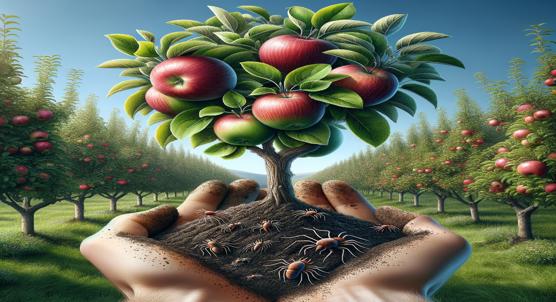
 13th July, 2024
| Jenn Hoskins
13th July, 2024
| Jenn Hoskins
Organic Fertilizers Boost Helpful Mite Populations in Apple Orchards
Boosting native predatory mites with organic fertilizers can naturally control spider mites in apple orchards, enhancing sustainable agriculture. Research shows organic materials promote prey mites, supporting predator mites and reducing pesticide reliance.
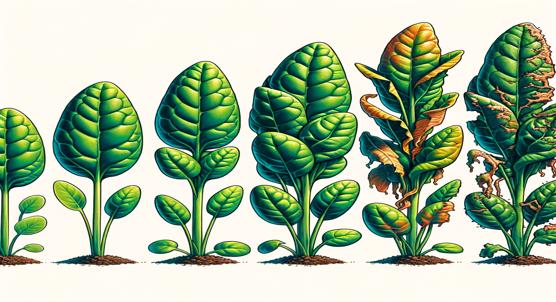
 13th July, 2024
| Jim Crocker
13th July, 2024
| Jim Crocker
How Baby Spinach Bacterial Quality Changes Over Time
Cornell research reveals that baby spinach from Salinas, CA, has higher bacterial concentrations than Yuma, AZ. Preharvest temperatures also impact bacteria levels. These findings could guide region-specific quality management to enhance consumer safety.

